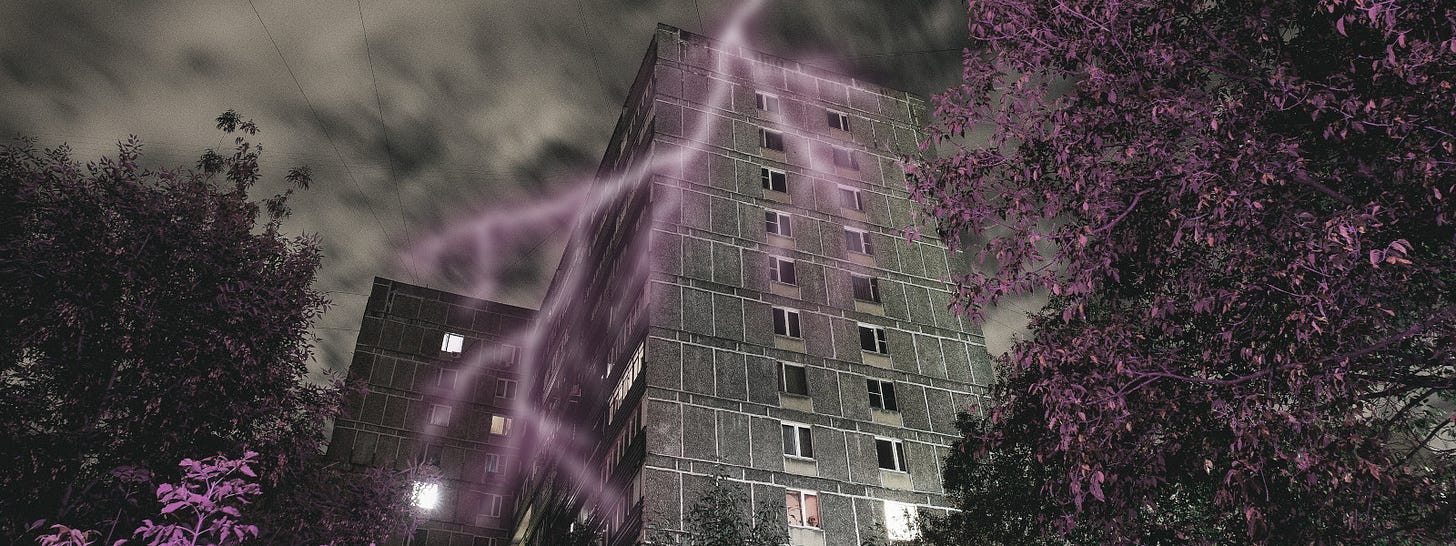They say you can’t turn back the clock, but Hector knew better. At night, as he moved from building to building, window to window, to observe unfolding secrets of ordinary people that hid behind their curtain cracks, he always encountered a peculiar sensation that started in his calves and moved into his upper chest. It reminded him freshly of life when he was a young boy which, outside of these excursions, he could never fully grasp.
These glimpses gave him goose bumps. They needled a dream closer to reality, a dream that people would one day stop hiding their true nature, expose themselves for who they really were, soft bellied up, like frogs on a science table. It wasn’t aberrant to dream, Hector would whisper to himself from the shadows, only deviant to pretend to be pure.
They say a sharded vessel of humanity can never be repaired, but Hector sat fat-first on this timid platitude of rabbits and pronounced himself free. He had found an exit from the savage ruins of his childhood.
His friend Winton agreed.
“You’re a god,” said Winton. He sat next to Hector on the steps of the cathedral. The sun was out; the streets busy.
“Not a god Winton. Just three men inside one body filled with cheese dogs and a desire to see the world tip.”
“Into righteousness?”
“No, honesty will do.”
When Hector was five, his father had furiously whipped him with a belt for a season of ten minutes that lasted twenty years in his heart for a lie about who had let the dog into the house. This punishment drove Hector to the far edge of life
“Want to see a movie?” asked Winton.
Hector blew scoff from his nose. “That’s money we don’t have and besides, real life is inside the houses at night.”
“One day they’re going to break you into a thousand pieces.”
They might, thought Hector. An angry husband or an ardent cop. They might catch Hector outside a window with his teeth clenched or with tears of joy on his face. He’d seen it all, the outside observer of falseness and fact.
“Come with me,” said Hector.
“No, I don’t think so.”
“Please Winton. You must. It’s all we got left.”
Winton reached for a nearby cigarette butt, almost a halfer, lit it, blew a little smoke, looked left and right before he nodded. These two, vagrants of an indifferent city, spent their days picking up discarded pieces of other lives and patrolling when they must for a temporary job. They found sense in uncommon places.
When the sun died for the day and subways drove workers from the cars onto platforms and the smog cooled and the dinner dishes scraped and the lights in the bathrooms turned off, Hector and Winton stood outside in the severing darkness. They watched through pale blinds as people undressed, read a book, put knives in their spouses, pretended their life was precious or at least wasn’t wasted, and kneeled before a statue with their head bowed. They watched lone mothers rinse dread from their faces and contemplate the mirror that exposed tomorrow as another today.
They moved through the city and watched through the night. It was story after story, naked truth after truth, until midnight at last fell prey to the quickening before dawn.
“What do we do?” whispered Winton. He ached.
“Nothing,” said Hector. “We can only watch.”
It made no sense to Winton. “Why don’t they do something?” he asked.
It made no real sense to Hector either, and he didn’t have an answer to a question that had lurked in the backroom of his thoughts for most of his life. It had something to do with masks and illusions. “They probably ask the same thing of us,” he said.
“Yeah, maybe all hope is dead.”
“It’s not, Winton. If they knew what we know, our shared scars, they might let the mask drop.” It was an infant idea, possibly miscarried, Hector admitted. Maybe only a reckless craving.
They say that all the beautiful people once lived on the street and pulled themselves up solo into their singular beautiful existence, but Hector knew that was a myth for sure. It took the whole city and by extension the world to weave both the ugly and the divine. If we could put our hearts into our hands when we shake, Hector liked to say, maybe we could see ourselves, flawed creature to creature, no curtain between us.
As the sky began to smolder and illuminate the tops of towers, Hector and Winton walked to the bus station, lay down with broken benches and slept. The city was quiet for now. It was a moment of calm, a lull between one life and another. It was a pleasant moment of forgetfulness, but it wouldn’t last. Soon day would take the city by the shoulders and shake, spilling people from their buoyant dreams into the light.
Thanks for reading Dynamic Creed. If you enjoyed this piece, please tell your friends. Subscribe for free to receive wonderful new fiction from the edge of life once a week. Yours in solidarity, Victor David.
Comment? Shall we have a comment? Okay, that would be great, I’d love it. Onward.




